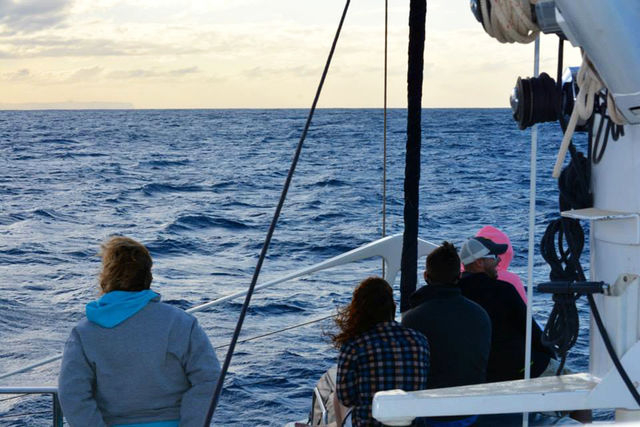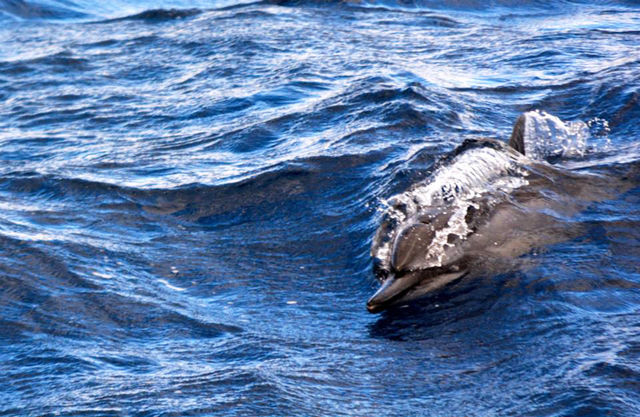PORT ALLEN — Swimming with spinner dolphins already constitutes animal harassment under the Marine Mammal Protection Act, but the National Marine Fisheries Service is pushing for further regulation. Tour companies on Kauai, however, aren’t concerned with the potential rules because
PORT ALLEN — Swimming with spinner dolphins already constitutes animal harassment under the Marine Mammal Protection Act, but the National Marine Fisheries Service is pushing for further regulation.
Tour companies on Kauai, however, aren’t concerned with the potential rules because they say they’re already following the practices recommended.
Representatives from Blue Dolphin Charters said their passengers aren’t allowed to swim with dolphins, but the spinner dolphins do like to ride their boat wakes often.
Kit Furderer, with Holo Holo Charters, confirmed none of the companies on Kauai have tours for swimming with dolphins.
“There are not any tours on Kauai that allow you to swim with dolphins,” Furderer said.
Furderer said Holo Holo Charters is already certified with the National Oceanic and Atmospheric Administration as “Dolphin Smart,” which is a voluntary education program that encourages responsible dolphin viewing.
“Holo Holo Charters supports protecting these animals and we feel it is very important to raise awareness with the public and our guests, which is why we follow these guidelines now,” Furderer said.
In a Tuesday announcement, the National Marine Fisheries Service said Hawaii’s spinner dolphins are being deprived of rest during the day and are stressed out because of the amount of human encounters during their daytime rest period.
The agency is pushing to require swimmers and vessels to stay at least 50 yards away from the dolphins. In the event humans are in the water with the dolphins, swimmers would have to make no effort to engage them and swim the other direction.
In a nutshell, that’s what is required to be certified as “Dolphin Smart” with NOAA.
The requirements for that program are: stay 50 yards from dolphins, move away cautiously if dolphins show signs of disturbance, refrain from feeding, touching, or swimming with wild dolphins, and teach others to be Dolphin Smart.
Furderer said the potential rules could have a larger impact on tour industries on other islands, though.
“That (tours specifically for swimming with dolphins) is a problem, though, on Maui and Oahu,” Furderer said.
Furderer said Holo Holo Charters doesn’t chase down dolphins, but typically the cetaceans do approach the company’s boats.
“That’s a different story,” Furderer said. “That is when we follow the Dolphin Smart protocols that we were trained in.”
The proposed rule would cover waters out to two nautical miles, which is where 98 percent of Hawaii’s spinner dolphins rest after a night of feeding. That’s also the stomping ground of most tour companies, which take their passengers to nearshore waters in search of dolphins.
Ann Garrett, assistant regional administrator of the National Marine Fisheries Service’s protected resources division for the Pacific Islands, said dolphins have been found to be burning calories at a higher rate because they are forced to be vigilant as people approach their pods.
Hawaii’s spinner dolphins get their name from their habit of leaping in the air and spinning around. Some scientists say such behavior is not always playfulness and can instead be an attempt by a dolphin to alert others to danger.
Spinner dolphins eat fish and small crustaceans that surface from the ocean depths at night. At daybreak, they gather in shallow bays to hide from tiger sharks and other predators.
Unlike the better-known bottlenose and other dolphin species in Hawaii waters, they are highly predictable in their behavior, returning to the same general area every day. That makes them easy for tour groups to find.
The rules would ensure a more peaceful day’s rest for the spinner dolphins, who can appear awake and active even when they are asleep because they rest half of their brains at a time, with the other half of their brains awake.
“All of these things (human interaction) can contribute to a reduction of fitness over time — this kind of chronic level of stress,” Garrett said. “That’s what we’re concerned about.”
Scientists have not done any studies on how frolicking with humans has affected the dolphins’ numbers. But they fear the stress will harm the animals’ ability to reproduce.
The federal agency plans to hold public meetings on the regulations next month and expects to make a final decision next year.
•••
The Associated Press contributed to this report.



